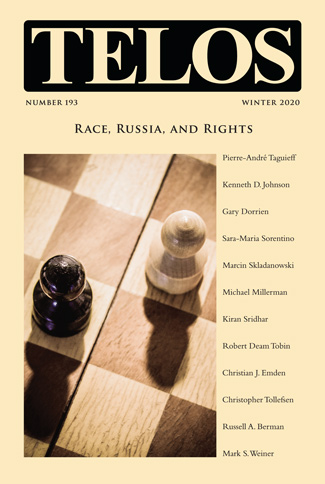By Julius Bielek · Tuesday, April 30, 2024 The following essay is part of a special series of responses to recent events centered, for now, at Columbia University, and extending beyond its confines to include the wider array of societal problems that the disorder there symptomatizes. For details, see Gabriel Noah Brahm, “From Palestine Avenue to Morningside Heights.”—Gabriel Noah Brahm, Director of the Telos-Paul Piccone Institute’s Israel initiative  When a student at the well-known Berlin art school Universität der Künste (UdK) used psychoanalytic terms to question her teacher’s assertion that we should listen to the “trees talking” more, she was attacked for her “colonial racist thinking,” using concepts of the white man, Sigmund Freud, to delegitimize “indigenous knowledge.” When a student at the well-known Berlin art school Universität der Künste (UdK) used psychoanalytic terms to question her teacher’s assertion that we should listen to the “trees talking” more, she was attacked for her “colonial racist thinking,” using concepts of the white man, Sigmund Freud, to delegitimize “indigenous knowledge.”
A few weeks later, UdK students protested against Israel fighting back against the insurgents of October 7th, with banners that read “Stop the Genocide” or “It’s Not Complicated.” Dressed in all black, wearing black corona masks, and holding up red hands, supposedly meant to symbolize the blood that was on Germany’s hands, or bingo!, it’s “indigenous custom.” The president of the university tried to intervene, but the protestors shouted him down.
Such protests marked the onset of a series of disturbances at Berlin universities following October 7th. These reached a culminating point when a Jewish Freie Universität student, Lahav Shapira—a known critic of the pro-Palestine protests and himself a descendant of one of the Israeli athletes murdered in the 1972 Munich massacre—was brutally attacked by an anti-Zionist Muslim student who recognized Shapira as he was exiting a bar. At first this made headlines in Germany—not because a Jew had been hospitalized after an antisemitic attack, but because he is the brother of the well-known comedian Shahak Shapira.
Continue reading →
By David Pan · Friday, December 18, 2020 Telos 193 (Winter 2020): Race, Russia, and Rights is now available for purchase in our store. Individual subscriptions to Telos are also available in both print and online formats.
 What is not up for discussion? The answer to this question defines a political order, and the repressiveness of such an order will depend on where this boundary is set between the discussable and the undiscussable. But it is not as if more discussion necessarily means less repression. Certain topics—genocide, torture, slavery—definitely need to be off the table as legitimate political measures. Other topics—the choosing of rulers and historical facts—need to be discussable in order to avoid tyranny. In between lies a gray area whose definition will establish the character of each political order. Conversely, a lack of consensus on this issue will lead to political instability that goes beyond the content of political debates, indicating that the question of discussability coincides with the problem of political identity. This issue of Telos will consider three areas in which discussability has become the main issue, leading to implacable conflict. What is not up for discussion? The answer to this question defines a political order, and the repressiveness of such an order will depend on where this boundary is set between the discussable and the undiscussable. But it is not as if more discussion necessarily means less repression. Certain topics—genocide, torture, slavery—definitely need to be off the table as legitimate political measures. Other topics—the choosing of rulers and historical facts—need to be discussable in order to avoid tyranny. In between lies a gray area whose definition will establish the character of each political order. Conversely, a lack of consensus on this issue will lead to political instability that goes beyond the content of political debates, indicating that the question of discussability coincides with the problem of political identity. This issue of Telos will consider three areas in which discussability has become the main issue, leading to implacable conflict.
Continue reading →
|
|
 When a student at the well-known Berlin art school Universität der Künste (UdK) used psychoanalytic terms to question her teacher’s assertion that we should listen to the “trees talking” more, she was attacked for her “colonial racist thinking,” using concepts of the white man, Sigmund Freud, to delegitimize “indigenous knowledge.”
When a student at the well-known Berlin art school Universität der Künste (UdK) used psychoanalytic terms to question her teacher’s assertion that we should listen to the “trees talking” more, she was attacked for her “colonial racist thinking,” using concepts of the white man, Sigmund Freud, to delegitimize “indigenous knowledge.” 


